Covid booster vaccines will be offered to 32million Britons from next month, it was claimed today.
Over 50s and immunosuppressed people, along with NHS and care home staff will be offered third doses from as soon as September 6.
The vaccines will be administered at up to 2,000 pharmacies, with the goal of 2.5m per week. And they will be dished out at the same time as flu jabs, ministers hope.
The Telegraph reports No10 is aiming to get the most vulnerable groups jabbed by mid-December, so the vaccine has at least fortnight to kick in before Christmas.
All eligible adults are expected to get a dose of Pfizer, regardless of which vaccine they received for their first two injections.
Latest data from Public Health England suggests the Pfizer injection is slightly more effective against the Indian ‘Delta’ stain, which could encourage the Government to adopt the mix-and-match strategy.
But Department of Health bosses have yet to confirm any official details of the UK’s booster scheme, with ministers waiting on final advice from the Joint Committee on Vaccination and Immunisation (JCVI).
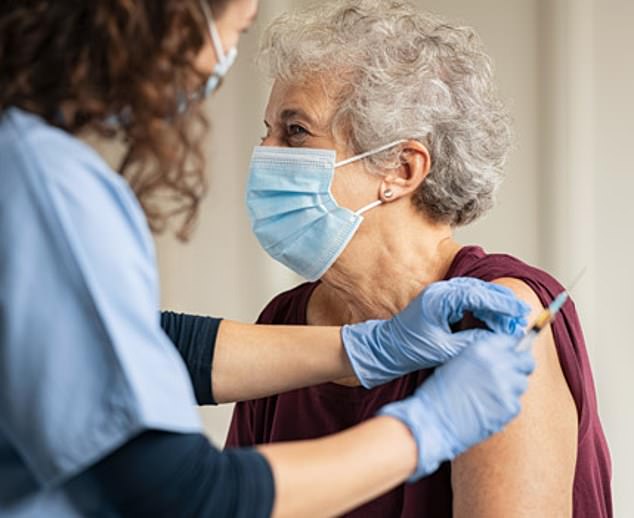
Over 90 per cent of over-60s in England have been jabbed, with the Government hoping a third booster jab will give even more protection
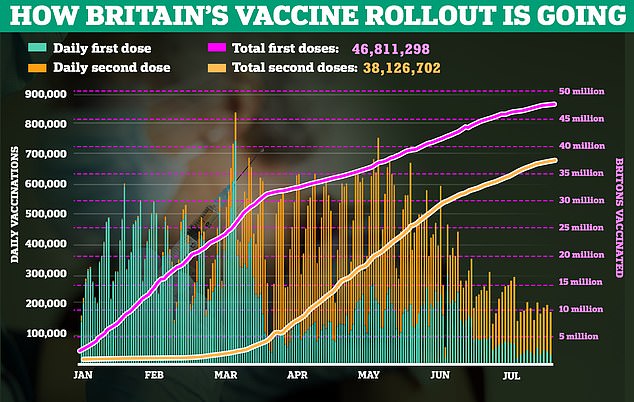
Prizes for having the jab: As No10 plans to hand out Uber rides and takeaways, insiders reveal free coffee and cinema tickets could be new incentives to beat Covid vaccine hesitancy in youngsters
Young people could be offered a free latte or cinema ticket in return for having the Covid jab under plans being discussed by ministers.
The Government yesterday announced commercial tie-ups that will see firms like Deliveroo and Uber offer discounted takeaways and taxi rides to people who sign up for vaccination.
A Government source said that further deals were expected in the coming days with cinema chains, coffee franchises and high street restaurants potentially involved.
However ministers have ruled out offering cash bribes as seen in the United States where newly-vaccinated citizens are to be offered $100 in cash, equal to £72.
‘There is a lot of work going on into broadening this out into other areas,’ the source said.
‘We will not be offering cash payments but we hope there will be a range of attractive high street incentives that will encourage more people to come forward and have the jab.’
Boris Johnson is said to be frustrated that 30 per cent of people aged under 30 have still not come forward for their first jab, more than six weeks after vaccinations were opened up to all adults.
A Government source said vaccinations in the age group were currently running at 40-50,000 a day, but added: ‘We’d like to be doing a lot more.’
Advertisement
The JCVI set out interim advice on the booster programme in June, advising that, if needed, the booster programme should begin in September.
Third jabs should first be offered to over-70s, over-16s who are immunosuppressed or extremely vulnerable, those living in care homes and frontline health and social care workers, they said.
In a second stage, the boosters should be given to remaining over-50s, over-16s who are at risk from the flu or Covid and those living with immunosuppressed individuals, the JCVI recommended.
The scientists said their final advice ‘may change substantially’ and will depend on emerging data, including on how long immunity lasts from two jabs.
The final recommendation from the experts is expected in the coming weeks.
But a Government source told the Telegraph the plan is to give flu and Covid boosters at the same time in different arms but it ‘depends on final JCVI advice and coronavirus vaccine booster trials’.
Ministers are hoping to increase the record number of jabs given in a single day through the programme – which stands at 873,784 given on March 20, the source added.
Immunity gained from Covid jabs last for at least six months in the ‘majority’ of cases.
But there are fears this could fade later in the year, which could trigger a spike in hospitalisations and deaths.
An Oxford University trial looking at booster doses suggested a third shot six months after the second could restore peak immunity against Covid.
Ministers are expected to set out plans for the Pfizer jab to be used in the booster programme.
A senior government source told the Times that those who received the AstraZeneca vaccine would ‘be getting an mRNA booster’.
MRNA used in the Pfizer and Moderna jabs is essentially a DNA instruction to tell your cells how to produce the harmless spike proteins from the virus – allowing your body to create an immune response without being exposed to the virus itself.
Oxford AstraZeneca is not an mRNA jab – instead using a weakened version of a common cold virus from chimpanzees that has been modified to contain genetic material shared by the coronavirus.
Scientists at Oxford University found in June that mixing and matching Covid jabs can give more protection, with those who got one AstraZeneca dose followed by a Pfizer jab having nine times more antibodies than those who stuck with the UK-made vaccine.
Experts who led the trial said the findings could have a ‘major impact’ on a booster regime and those who got two AstraZeneca jabs ‘should probably be offered the Pfizer vaccine’.
Additionally, two doses of the Pfizer jab are 96 per cent effective against hospitalisation, but this dropped to 92 per cent after the AstraZeneca jab.
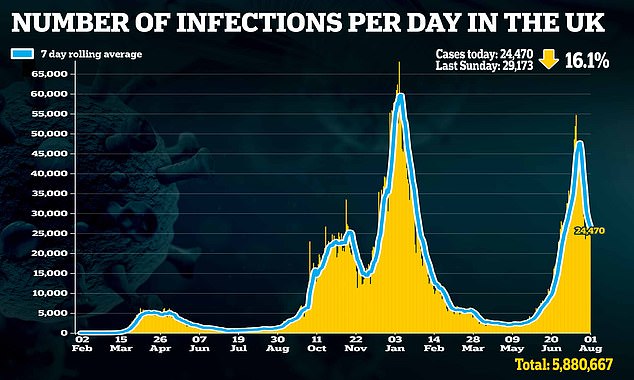
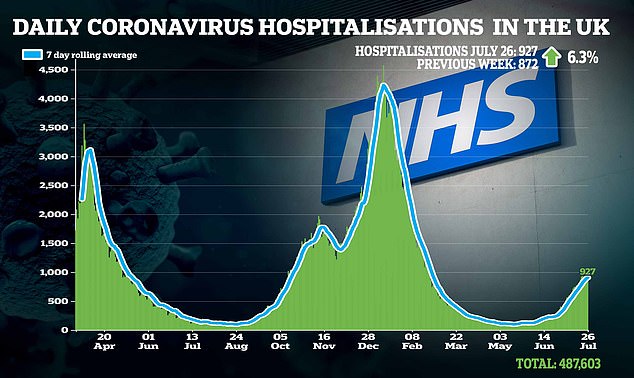
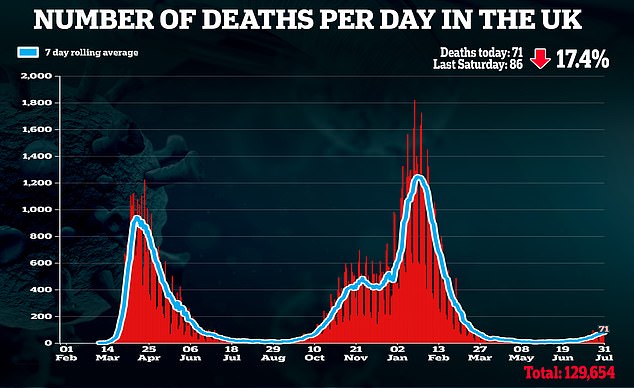
Ten-year age drop in Covid patients: Vaccine rollout has led to slump in number of older people in intensive care as average age of the seriously-ill falls to 49
The average age of Covid patients in intensive care has plummeted by ten years because of the vaccine rollout.
Over the past three months, the critically-ill have been 49 on average, compared with 59 in the second wave of the pandemic.
Around half of those admitted to intensive care units are under 50, and nearly one third under 40.
The NHS figures illustrate the dramatic success of vaccines in protecting older adults, almost all of whom have been double-jabbed.
Wards are instead filling up with those most likely to be unvaccinated, including young adults, pregnant women and people from black or deprived communities.
Coronavirus is still in retreat across Britain, boosting hopes that the third wave is ebbing.
Weekly infections are down by 30 per cent and yesterday 24,470 cases were reported, down from a summer peak of 54,674 on July 17.
Advertisement
A study published this week also showed that a third dose of the Pfizer vaccine could offer strong protection against the Delta variant.
Research showed that antibody levels increased five-fold among people ages 18 to 55 who were given the booster shot.
The third dose was especially effecting for the elderly, with antibody levels spiking 11-fold among people aged 65 to 85 who had already received the standard two doses.
The roll-out could also see a move away from GPs and mass vaccination sites, with more reliance on pharmacies.
The number of pharmacies offering the jabs are expected to triple from 650 to nearly 2,000, but this is a fraction of the 9,500 that offer flu vaccines, according to the Telegraph.
This would take pressure off other parts of the health service, which are attempting to tackle the record high NHS waiting list and increasing A&E admissions.
Former Health Secretary Matt Hancock announced plans to get more pharmacies involved in the rollout in June.
Andrew Lane, chair of the National Pharmacy Association, told the Telegraph increasing the number of pharmacies offering the jab would let GPs focus on tackling the NHS backlog.
He had met with vaccine minister Nadhim Zahawi, who acknowledged people trust their local pharmacies, which are in all communities, including the most deprived areas of the country.
He said: ‘After the mass vaccination centres are wound down, pharmacies will still be there for the long haul out of this nightmare.’
But it is not yet proven that booster doses are needed, so it is unclear who needs them, when and how often.
Some scientists and the World Health Organization said getting first jabs into unvaccinated adults in other countries should be the priority, because they are the most vulnerable.
A Department of Health and Social Care spokesperson said: ‘The government is preparing for a booster programme and JCVI have published interim advice on who to prioritise for a possible third vaccine from September 2021.
‘The booster programme – which would ensure millions of people most vulnerable to Covid will have the protection they have from first and second doses maintained ahead of the winter and against new variants – will be informed by the JCVI’s final advice.
‘We are working with the NHS as they draw up detailed plans to deliver this booster vaccination programme, alongside the annual flu vaccination programme, and more details about rollout will be set out in due course.’
It comes as 85.1million vaccines have been administered across the UK, with 88.6 per cent of adults having one dose and 72.5 per cent being fully immunised.
The latest data from Public Health England and Cambridge University suggests that about 60,000 deaths, 22 million infections and 52,600 hospitalisations have been prevented by vaccines.
The Government plans to lure young people in for their vaccinations with the promise of cut-price taxis and takeaways, as Boris Johnson tries to tackle the relatively low take-up among the under-30s.
Uber, Deliveroo and Pizza Pilgrims are among the companies in discussion with the Government about offering incentives as part of the ‘Jab 18-30’ drive.
So far, only two-thirds of people in that age bracket in England have received a first dose since they became eligible in June, compared with 88.4 per cent across all age groups, meaning more than three million 18-to-30-year-olds remain unjabbed.
Source link : https://www.dailymail.co.uk/news/article-9851367/Booster-vaccine-drive-begins-month-50s-dose-alongside-annual-flu-jab.html











